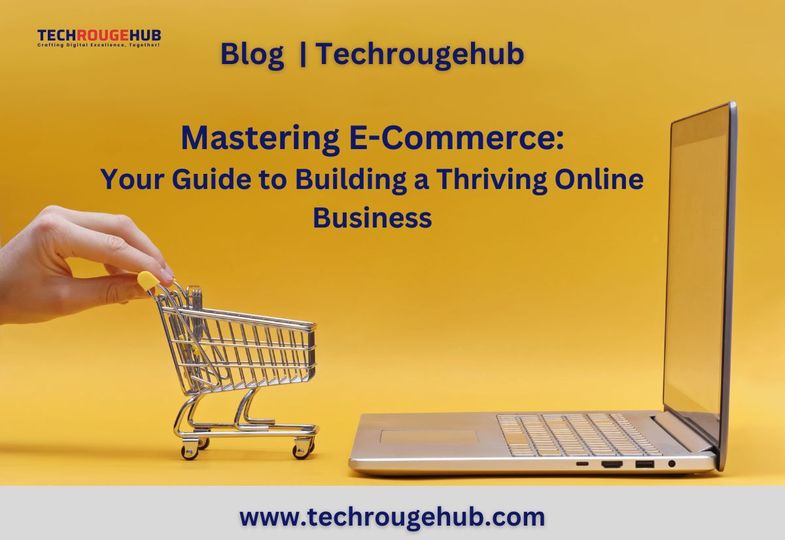In the digital age, the landscape of commerce has been profoundly transformed by the rise of e-commerce. This revolution has not only reshaped consumer behavior but also provided businesses—both big and small—with unprecedented opportunities to reach global markets. Whether you’re an aspiring entrepreneur or an established business owner, understanding the dynamics of e-commerce is crucial to thriving in today’s competitive environment.
What is E-Commerce?
E-commerce, short for electronic commerce, refers to the buying and selling of goods or services using the internet, and the transfer of money and data to execute these transactions. This business model includes various types, from B2B (business to business) and B2C (business to consumer) to C2C (consumer to consumer) and C2B (consumer to business).
The Growth of E-Commerce
The growth trajectory of e-commerce has been nothing short of remarkable. From the early days of online retail in the 1990s to the sophisticated platforms we see today, the sector has evolved rapidly. The COVID-19 pandemic further accelerated this trend, as lockdowns and social distancing measures drove consumers to shop online more than ever before. In 2024, global e-commerce sales are projected to reach $6.4 trillion, underscoring the massive scale and potential of the industry.
Benefits of E-Commerce
E-commerce offers numerous advantages for businesses and consumers alike:
Global Reach: Unlike traditional brick-and-mortar stores, e-commerce businesses are not bound by geographical limitations. With the right digital marketing strategies, a business can attract customers from around the world.
Lower Operational Costs: Operating an online store typically requires less overhead than a physical store. Costs such as rent, utilities, and in-store staff can be significantly reduced or eliminated altogether.
Convenience and Accessibility: E-commerce provides consumers with the convenience of shopping from anywhere at any time. This 24/7 availability can lead to increased sales and customer satisfaction.
Personalized Shopping Experience: With the help of data analytics and AI, e-commerce platforms can offer personalized recommendations to customers, enhancing their shopping experience and increasing conversion rates.
Scalability: E-commerce businesses can scale more easily than traditional businesses. As demand grows, businesses can expand their online presence with minimal additional costs.
Steps to Building a Successful E-Commerce Business
Building a successful e-commerce business requires strategic planning and execution. Here are key steps to consider:
1. Identify Your Niche
Before diving into the e-commerce world, it’s essential to identify a niche that aligns with your interests, expertise, and market demand. A well-defined niche will help you stand out in a crowded marketplace and target a specific audience more effectively.
2. Choose the Right E-Commerce Platform
Selecting the right platform is critical to the success of your online store. Popular platforms like Shopify, WooCommerce, and Magento offer various features and pricing models. Consider factors such as ease of use, customization options, scalability, and integrations with other tools when making your choice.
3. Build a User-Friendly Website
Your website is the face of your e-commerce business. It should be visually appealing, easy to navigate, and optimized for both desktop and mobile devices. Ensure that your site has fast loading times, secure payment gateways, and clear product descriptions with high-quality images.
4. Develop a Strong Brand Identity
Branding is key to differentiating your business from competitors. Create a unique brand identity that resonates with your target audience. This includes a memorable logo, a consistent color scheme, and a compelling brand story that communicates your values and mission.
5. Implement Effective Marketing Strategies
To attract and retain customers, you need a robust digital marketing strategy. Utilize SEO, social media marketing, email marketing, and pay-per-click (PPC) advertising to drive traffic to your site. Content marketing, including blogs and videos, can also help build your brand authority and engage your audience.
6. Focus on Customer Experience
Customer experience is paramount in e-commerce. Provide excellent customer service, offer easy returns and exchanges, and solicit feedback to continually improve your offerings. Personalized emails, loyalty programs, and exclusive discounts can help build customer loyalty.
7. Monitor Analytics and Optimize
Regularly monitor your website’s analytics to understand customer behavior and identify areas for improvement. Use tools like Google Analytics to track key metrics such as traffic, conversion rates, and average order value. Continuously test and optimize your website, marketing campaigns, and product offerings based on data-driven insights.
Challenges in E-Commerce
While e-commerce offers numerous opportunities, it also comes with its own set of challenges:
Competition: The ease of entry into e-commerce means that the market is highly competitive. Differentiating your brand and products is essential for success.
Cybersecurity: Protecting customer data and ensuring secure transactions are critical. Businesses must invest in robust cybersecurity measures to prevent breaches.
Logistics and Supply Chain Management: Managing inventory, shipping, and returns can be complex, particularly for businesses that scale rapidly. Efficient logistics are key to maintaining customer satisfaction.
Regulatory Compliance: E-commerce businesses must navigate a complex web of regulations, including consumer protection laws, data privacy regulations, and international trade rules.
Conclusion
The e-commerce industry presents a wealth of opportunities for entrepreneurs willing to embrace the digital marketplace. By carefully planning your approach, investing in the right tools, and focusing on customer experience, you can build a successful online business that stands the test of time. As the e-commerce landscape continues to evolve, staying adaptable and informed will be key to long-term success.
Contact us today to make your own online ecommerce store :+923353948710

